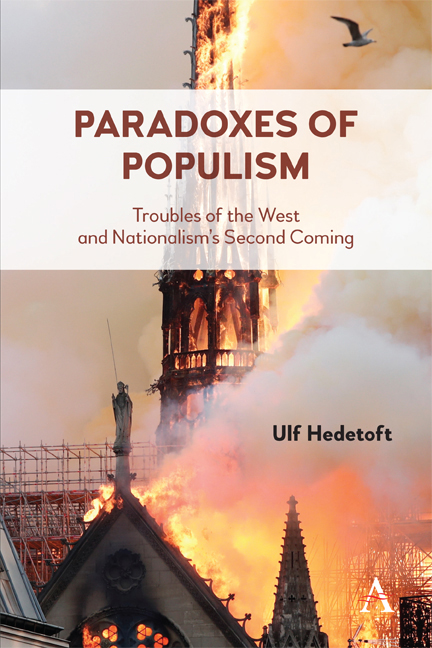Book contents
- Frontmatter
- Contents
- Acknowledgments
- 1 Introduction
- 2 What Is the Problem?
- 3 The People and Popular Sovereignty. Back to Basics, and Onward …
- 4 The Nationalization of the People
- 5 Fantasies and Paradoxes of Populism
- 6 Myths and Misconceptions
- 7 Sweden-Intransigent Moralities at War in the Peopleâs Home
- 8 Catalonia-Toward a State Truly Our Own!
- 9 Hungary-Righteous Revenge for Historic Humiliations
- 10 Brexit-Between Despair and Delusion
- 11 The United States-Normalizing a Superpower by Abnormal Means
- 12 Extractions and Perspectives
- References
- Index
- Frontmatter
- Contents
- Acknowledgments
- 1 Introduction
- 2 What Is the Problem?
- 3 The People and Popular Sovereignty. Back to Basics, and Onward …
- 4 The Nationalization of the People
- 5 Fantasies and Paradoxes of Populism
- 6 Myths and Misconceptions
- 7 Sweden-Intransigent Moralities at War in the Peopleâs Home
- 8 Catalonia-Toward a State Truly Our Own!
- 9 Hungary-Righteous Revenge for Historic Humiliations
- 10 Brexit-Between Despair and Delusion
- 11 The United States-Normalizing a Superpower by Abnormal Means
- 12 Extractions and Perspectives
- References
- Index
Summary
A specter by the name of populism haunts not just Europe but the entire Western world. And as the case is with all specters, it is an oddly elusive being, doing its best to avoid precise description. It is analytically and conceptually hard to catch. Its nature is contested, being variously seen as an ideology, a discourse, a morality or a political strategy (cf. Gidron and Bonikowski 2014; Ionescu and Gellner 1969; Kaltwasser et al. 2017).
It undoubtedly puts on all of these clothes at different points in time and in different settings, precisely like its parent, mainstream nationalism itself. I see the core of populism as being exactly that: a child of nationalism and national identity, its oft- quoted “thin ideology” (Mudde 2004; Stanley 2008) having risen in political impact and visibility since the turn of the century, in Western and non- Western countries alike. It shares with mainstream nationalism the insistence on the pivotal role of “the people,” on the importance of national sovereignty, on the centrality of cultural and historical homogeneity and on the division between “us” as laudable and “them” as foreign and potentially threatening, whether in the form of immigrants, supranational collaboration or the EU.
However, it also differs from the normal design of nationalism and national identities by adding, to its list of opponents, people and groups normally considered an integral part of the national setup— elites especially— and by placing extraordinary and hyper- moralistic stress on the role of “the people” as the ultimate umpire and principal referent of the rightful composition and future of the nation- state and its borders. Furthermore, it is not concerned with recognizing other nation- states, nor the international order, but is basically intent on keeping its own territory and population clean, pure and uncontaminated; its borders rigid and unassailable; and its cultural heritage and popular memories proud and protected.
Thus far it may come across as little more than an extreme form of national belonging— nationalism run wild so to speak— a case for national psychologists or a kind of collective pathology.
- Type
- Chapter
- Information
- Paradoxes of PopulismTroubles of the West and Nationalism's Second Coming, pp. 1 - 10Publisher: Anthem PressPrint publication year: 2020



